Papers by Shamini Attanayaka
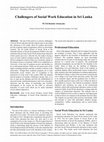
International Journal of Social Work and Human Services Practice, 2016
The aim of this article is to discuss challengers of Social Work education and the related issues... more The aim of this article is to discuss challengers of Social Work education and the related issues in providing this education in Sri Lanka. Most Sri Lankan universities provide academic degree programmes which are knowledge oriented. The Sri Lanka School of Social Work at the National Institute of Social Development (NISD) is the only institution that provides Social Work professional education in this country up to now. After the war, Sri Lanka is facing a series of issues related to displace people. But the country is still not equipped to attend to these in a systematic manner as the human resource is untrained. NISD is not established as a University. It has lack of academic powers and facilities to be an educational institute. Public are not much aware of the degree awarding institutes and they consider it inferior to the universities. Though these academic programs are to train professional social workers lack of recognition to the profession of social work in the country affect the demand and the purpose of training. Challenges emerge, then, as to how to open up the dialogue and how the establishment of universal norms, institutional practices and views of people's behaviour and the nature of knowledge and scientific development in the search for the truth' as universal principles of social work which can be easily translated across cultural imperatives.

Environmental Research Letters, 2021
The impacts of falling ice (snow) radiative effects (FIREs) on simulated surface wind stress and ... more The impacts of falling ice (snow) radiative effects (FIREs) on simulated surface wind stress and sea surface temperature (SST) in Central Pacific El Niño (CP-El Niño) under a progressive warming climate are examined. Using controlled simulations with the CESM1 model, it is shown that the exclusion of FIREs (No snow: NOS) generates persistent westerly anomalies in surface wind stress relative to that with FIREs (Snow on: SON). These anomalies subsequently lead to a weakening of the easterly trade winds associated with warmer SST anomalies in modeled life cycle. Results over three separated 40-year intervals (P1: 21-60 years; P2: 61-100 years; P3: 101-140 years) are compared with Coupled Model Intercomparison Project phase 5 (CMIP5) models without FIREs. Both NOS configuration and CMIP5 models simulate longer life cycles of CP-El Niño events with weakening easterlies and warmer SST anomalies on the equator, persistently propagating eastward from the mature to dissipating phases. Compa...
This paper is a personal reflection on social work and what constitutes a social worker, with spe... more This paper is a personal reflection on social work and what constitutes a social worker, with special reference to Sri Lanka. Drawing from global literature, it observes that the field of social work has evolved to become a package of knowledge, skills, competencies, code of ethics, and accreditation standards. Therefore, qualified social workers today possess a set of practical as well as academic competencies that is designed to address issues not only at the macro and mezzo level, but also at the individual and family levels. The paper argues that Sri Lanka has yet to adopt a multi-faceted social work approach like this, and explores the possibility of enhancing the institutional capacity of the National Institute for Social Development (the country's only institute of higher education that offers professional social work education) to deliver such approach.
Conference Presentations by Shamini Attanayaka
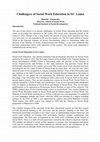
Challengers of Social Work Education in Sri Lanka
Shamini Attanayake
Director, School of Soci... more Challengers of Social Work Education in Sri Lanka
Shamini Attanayake
Director, School of Social Work
National Institute of Social Development
Introduction
The aim of this article is to discuss challengers of Social Work education and the related issues in providing this education in Sri Lanka. The social work education started in Sri Lanka in 1952. Though it has a long history the growth of social work education has been very slow and it is not expanded to all over the country yet. The Sri Lanka School of Social Work at the National Institute of Social Development, which is functioning under the purview of the Ministry of Social Empowerment and Welfare , is the only institution that provides professional social work education in the country. The social work education is conducted at the tertiary level.
Social Work Education in Sri Lanka
Social work Education was already mentioned that professional education for Social Work started in Sri Lanka in 1952. The Sri Lanka School of Social Work at the National Institute of Social Development (NISD), which is functioning under the purview of the Ministry of Social Empowerment and Welfare, is the only institution that provides Social Work professional education in this country up to now. This means social work education has been providing by the Sri Lanka School of Social Work for more than 60 years by now. After about 50 years it was recognized as a degree awarding institute. None of the Universities paid any attention to the field of social work until the Tsunami disaster happened in Sri Lanka in 2004. Most of the people do not understand the difference between Social Work and Sociology. Four universities have introduced some course units in Social Work in Sociology special degree courses. They are just introductory courses in Social Work. Social Work is a separate discipline, a field of study and a profession. It has its own internationally designated titles for degrees as Bachelor of Social Work and Master of Social Work. They are the basic qualifications to be registered as Professional Social Workers in most of the countries. The NISD conducts three levels of professional courses in Social Work. They are the Diploma in Social Work, Bachelors degree in Social Work and the Masters degree in Social Work. The Diploma in Social Work commenced in 1978 as a full-time two year programme is conducted in local languages; Sinhala and Tamil. After the NISD was declared as a degree awarding institute by the UGC in 2005 it was empowered to conduct and afford Bachelor of Social Work degree. The BSW course was started in 2005 and the Masters in Social Work programme commenced in 2008.
The common features of the curricular of the three educational courses are that they consist of both theoretical learning at the classroom and the practical learning at the field. The theoretical knowledge provided in two major areas as understanding human behavior and social work methods on working with individuals, families, groups, communities and organizations. The field work is organized by the Field work coordinator of the School of Social Work. There is a cadre of local supervisors trained by the school to supervise students. The students are placed in social welfare agencies to practice case management and group work and for community work. Some students are directly sent to the communities by the school and some are through NGOs who are having community work programmes.
Role of Social Workers in Sri Lanka
Sri Lanka has experienced rapid socioeconomic changes during the past. The prolonged civil war was over and the country is reawakening. The society will have more changes in the future with having more emphasis in economic development. It is inevitable that people have to adapt to these changes and those who cannot adapt to the situations will have to face with problems. There could be multiple reasons for the development of the problems. It is the role of the social scientists to study these situations, analyze and interpret the situations but the role of the social worker is to intervene at the situations of human interactions to find out solutions for the problems faced by the people for their well-being. Problems could be located with individuals, families, groups and communities. They could be related with lack of availability of service delivery systems or due to absence of social policies. Sri Lanka needs thousands and thousands of social workers to work in variety of field settings. They are required to work in institutions as well as in the communities. They have to engage in curative, preventive and developmental social work. Some of the institutions which need social workers are mental hospitals, schools, prisons, camps for displaced people and resettlement villages. Some of the categories of populations which need social work interventions are disable people, children, victims of the crimes, single women headed families, workers in the industries and people living under poverty. At present there are about 2500 social workers trained by the Sri Lanka School of Social Work. However there is no system of registration and issuing licenses for social workers in the country to identify them as professional social workers. The Sri Lanka Association of Professional Social Workers has proposed to bring legislation through a Parliamentary bill to establish a Regulatory Body for Professional Social Workers in Sri Lanka. It is the duty of all to join hands with the association to bring it to a reality.
The Challenges
The Challenge before social work lies in the complexity of issues that Sri Lanka grapples with in the psycho social shear which is clamoring for the need for social works, conservatively estimated to be around 30,000 for a total population of 20 million.. Sri Lanka is a Developing country, after war thousands of displaced persons, and the list of serious social problem is disturbing. There are numerous groups undergoing severe hardship, excluded from the mainstream, denied basic human dignity, betrayed by the new economic arrangements for assistance. But the country is still not equipped to attend to these in a systematic manner as the human resource is untrained. This paper is intended to be an introduction to the hope that the teacher and the student may both benefit from the coverage of some theoretical material as these have not been made available to the Sri Lankan social workers. I have also attempted to contextualize the subject so that it may take a Sri Lankan flavor which I believe is essential. Western Social Work cannot be copied for an Asian society. Social and cultural arrangements are very different in Western models of practice. the types of social work practice even among the developed West, the relevant theory and delivery are varied Social workers role is associated with certain key terms and to name just a few, they are well being, injustice, human dignity, and exclusivity. The social worker is mostly addressing the dis economies of growth. In contemporary Sri Lankan society there are numerous individuals and group who are marginalized by the social and economic arrangements under which we all live.
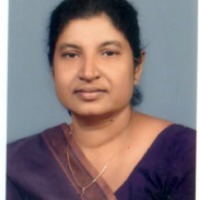



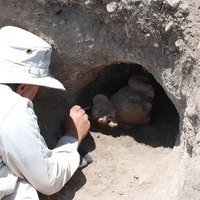



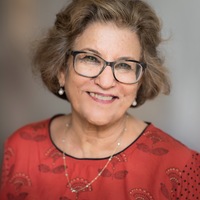

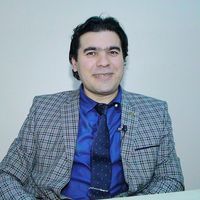
Uploads
Papers by Shamini Attanayaka
Conference Presentations by Shamini Attanayaka
Shamini Attanayake
Director, School of Social Work
National Institute of Social Development
Introduction
The aim of this article is to discuss challengers of Social Work education and the related issues in providing this education in Sri Lanka. The social work education started in Sri Lanka in 1952. Though it has a long history the growth of social work education has been very slow and it is not expanded to all over the country yet. The Sri Lanka School of Social Work at the National Institute of Social Development, which is functioning under the purview of the Ministry of Social Empowerment and Welfare , is the only institution that provides professional social work education in the country. The social work education is conducted at the tertiary level.
Social Work Education in Sri Lanka
Social work Education was already mentioned that professional education for Social Work started in Sri Lanka in 1952. The Sri Lanka School of Social Work at the National Institute of Social Development (NISD), which is functioning under the purview of the Ministry of Social Empowerment and Welfare, is the only institution that provides Social Work professional education in this country up to now. This means social work education has been providing by the Sri Lanka School of Social Work for more than 60 years by now. After about 50 years it was recognized as a degree awarding institute. None of the Universities paid any attention to the field of social work until the Tsunami disaster happened in Sri Lanka in 2004. Most of the people do not understand the difference between Social Work and Sociology. Four universities have introduced some course units in Social Work in Sociology special degree courses. They are just introductory courses in Social Work. Social Work is a separate discipline, a field of study and a profession. It has its own internationally designated titles for degrees as Bachelor of Social Work and Master of Social Work. They are the basic qualifications to be registered as Professional Social Workers in most of the countries. The NISD conducts three levels of professional courses in Social Work. They are the Diploma in Social Work, Bachelors degree in Social Work and the Masters degree in Social Work. The Diploma in Social Work commenced in 1978 as a full-time two year programme is conducted in local languages; Sinhala and Tamil. After the NISD was declared as a degree awarding institute by the UGC in 2005 it was empowered to conduct and afford Bachelor of Social Work degree. The BSW course was started in 2005 and the Masters in Social Work programme commenced in 2008.
The common features of the curricular of the three educational courses are that they consist of both theoretical learning at the classroom and the practical learning at the field. The theoretical knowledge provided in two major areas as understanding human behavior and social work methods on working with individuals, families, groups, communities and organizations. The field work is organized by the Field work coordinator of the School of Social Work. There is a cadre of local supervisors trained by the school to supervise students. The students are placed in social welfare agencies to practice case management and group work and for community work. Some students are directly sent to the communities by the school and some are through NGOs who are having community work programmes.
Role of Social Workers in Sri Lanka
Sri Lanka has experienced rapid socioeconomic changes during the past. The prolonged civil war was over and the country is reawakening. The society will have more changes in the future with having more emphasis in economic development. It is inevitable that people have to adapt to these changes and those who cannot adapt to the situations will have to face with problems. There could be multiple reasons for the development of the problems. It is the role of the social scientists to study these situations, analyze and interpret the situations but the role of the social worker is to intervene at the situations of human interactions to find out solutions for the problems faced by the people for their well-being. Problems could be located with individuals, families, groups and communities. They could be related with lack of availability of service delivery systems or due to absence of social policies. Sri Lanka needs thousands and thousands of social workers to work in variety of field settings. They are required to work in institutions as well as in the communities. They have to engage in curative, preventive and developmental social work. Some of the institutions which need social workers are mental hospitals, schools, prisons, camps for displaced people and resettlement villages. Some of the categories of populations which need social work interventions are disable people, children, victims of the crimes, single women headed families, workers in the industries and people living under poverty. At present there are about 2500 social workers trained by the Sri Lanka School of Social Work. However there is no system of registration and issuing licenses for social workers in the country to identify them as professional social workers. The Sri Lanka Association of Professional Social Workers has proposed to bring legislation through a Parliamentary bill to establish a Regulatory Body for Professional Social Workers in Sri Lanka. It is the duty of all to join hands with the association to bring it to a reality.
The Challenges
The Challenge before social work lies in the complexity of issues that Sri Lanka grapples with in the psycho social shear which is clamoring for the need for social works, conservatively estimated to be around 30,000 for a total population of 20 million.. Sri Lanka is a Developing country, after war thousands of displaced persons, and the list of serious social problem is disturbing. There are numerous groups undergoing severe hardship, excluded from the mainstream, denied basic human dignity, betrayed by the new economic arrangements for assistance. But the country is still not equipped to attend to these in a systematic manner as the human resource is untrained. This paper is intended to be an introduction to the hope that the teacher and the student may both benefit from the coverage of some theoretical material as these have not been made available to the Sri Lankan social workers. I have also attempted to contextualize the subject so that it may take a Sri Lankan flavor which I believe is essential. Western Social Work cannot be copied for an Asian society. Social and cultural arrangements are very different in Western models of practice. the types of social work practice even among the developed West, the relevant theory and delivery are varied Social workers role is associated with certain key terms and to name just a few, they are well being, injustice, human dignity, and exclusivity. The social worker is mostly addressing the dis economies of growth. In contemporary Sri Lankan society there are numerous individuals and group who are marginalized by the social and economic arrangements under which we all live.
Shamini Attanayake
Director, School of Social Work
National Institute of Social Development
Introduction
The aim of this article is to discuss challengers of Social Work education and the related issues in providing this education in Sri Lanka. The social work education started in Sri Lanka in 1952. Though it has a long history the growth of social work education has been very slow and it is not expanded to all over the country yet. The Sri Lanka School of Social Work at the National Institute of Social Development, which is functioning under the purview of the Ministry of Social Empowerment and Welfare , is the only institution that provides professional social work education in the country. The social work education is conducted at the tertiary level.
Social Work Education in Sri Lanka
Social work Education was already mentioned that professional education for Social Work started in Sri Lanka in 1952. The Sri Lanka School of Social Work at the National Institute of Social Development (NISD), which is functioning under the purview of the Ministry of Social Empowerment and Welfare, is the only institution that provides Social Work professional education in this country up to now. This means social work education has been providing by the Sri Lanka School of Social Work for more than 60 years by now. After about 50 years it was recognized as a degree awarding institute. None of the Universities paid any attention to the field of social work until the Tsunami disaster happened in Sri Lanka in 2004. Most of the people do not understand the difference between Social Work and Sociology. Four universities have introduced some course units in Social Work in Sociology special degree courses. They are just introductory courses in Social Work. Social Work is a separate discipline, a field of study and a profession. It has its own internationally designated titles for degrees as Bachelor of Social Work and Master of Social Work. They are the basic qualifications to be registered as Professional Social Workers in most of the countries. The NISD conducts three levels of professional courses in Social Work. They are the Diploma in Social Work, Bachelors degree in Social Work and the Masters degree in Social Work. The Diploma in Social Work commenced in 1978 as a full-time two year programme is conducted in local languages; Sinhala and Tamil. After the NISD was declared as a degree awarding institute by the UGC in 2005 it was empowered to conduct and afford Bachelor of Social Work degree. The BSW course was started in 2005 and the Masters in Social Work programme commenced in 2008.
The common features of the curricular of the three educational courses are that they consist of both theoretical learning at the classroom and the practical learning at the field. The theoretical knowledge provided in two major areas as understanding human behavior and social work methods on working with individuals, families, groups, communities and organizations. The field work is organized by the Field work coordinator of the School of Social Work. There is a cadre of local supervisors trained by the school to supervise students. The students are placed in social welfare agencies to practice case management and group work and for community work. Some students are directly sent to the communities by the school and some are through NGOs who are having community work programmes.
Role of Social Workers in Sri Lanka
Sri Lanka has experienced rapid socioeconomic changes during the past. The prolonged civil war was over and the country is reawakening. The society will have more changes in the future with having more emphasis in economic development. It is inevitable that people have to adapt to these changes and those who cannot adapt to the situations will have to face with problems. There could be multiple reasons for the development of the problems. It is the role of the social scientists to study these situations, analyze and interpret the situations but the role of the social worker is to intervene at the situations of human interactions to find out solutions for the problems faced by the people for their well-being. Problems could be located with individuals, families, groups and communities. They could be related with lack of availability of service delivery systems or due to absence of social policies. Sri Lanka needs thousands and thousands of social workers to work in variety of field settings. They are required to work in institutions as well as in the communities. They have to engage in curative, preventive and developmental social work. Some of the institutions which need social workers are mental hospitals, schools, prisons, camps for displaced people and resettlement villages. Some of the categories of populations which need social work interventions are disable people, children, victims of the crimes, single women headed families, workers in the industries and people living under poverty. At present there are about 2500 social workers trained by the Sri Lanka School of Social Work. However there is no system of registration and issuing licenses for social workers in the country to identify them as professional social workers. The Sri Lanka Association of Professional Social Workers has proposed to bring legislation through a Parliamentary bill to establish a Regulatory Body for Professional Social Workers in Sri Lanka. It is the duty of all to join hands with the association to bring it to a reality.
The Challenges
The Challenge before social work lies in the complexity of issues that Sri Lanka grapples with in the psycho social shear which is clamoring for the need for social works, conservatively estimated to be around 30,000 for a total population of 20 million.. Sri Lanka is a Developing country, after war thousands of displaced persons, and the list of serious social problem is disturbing. There are numerous groups undergoing severe hardship, excluded from the mainstream, denied basic human dignity, betrayed by the new economic arrangements for assistance. But the country is still not equipped to attend to these in a systematic manner as the human resource is untrained. This paper is intended to be an introduction to the hope that the teacher and the student may both benefit from the coverage of some theoretical material as these have not been made available to the Sri Lankan social workers. I have also attempted to contextualize the subject so that it may take a Sri Lankan flavor which I believe is essential. Western Social Work cannot be copied for an Asian society. Social and cultural arrangements are very different in Western models of practice. the types of social work practice even among the developed West, the relevant theory and delivery are varied Social workers role is associated with certain key terms and to name just a few, they are well being, injustice, human dignity, and exclusivity. The social worker is mostly addressing the dis economies of growth. In contemporary Sri Lankan society there are numerous individuals and group who are marginalized by the social and economic arrangements under which we all live.